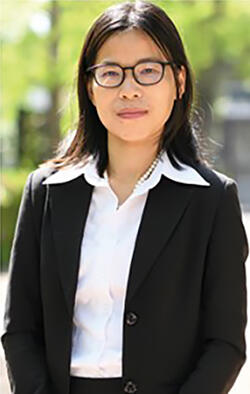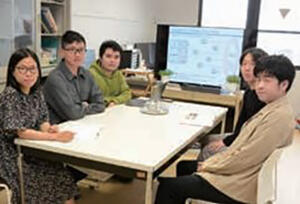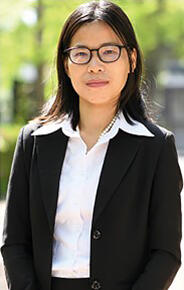
Lecturer, Graduate School of Informatics, Osaka Metropolitan University
Q1. What led you to take on this research project?
A1. Wanting to reduce the burden of paperwork during hospital visits, and having an interest in blockchain
When I was at high school and university in Vietnam, I had a vague idea of wanting to create information systems to support schools and teachers in the future. I think this was one reason I moved into the hardware field, as it supports information processing.
After a research period in Japan, I became interested in blockchain, which features distributed information management. My interest was sparked by what happened when I took my children to hospital. Visiting that hospital for the first time, I had to write in their names, address, and medical histories. I wondered if I could create a new information system capable of sharing large amounts of data registered by patients between hospitals in order to reduce the burden of paperwork on hospitals and patients.
However, current technology has issues with system data security and the protection of personal information, making implementation problematic. However, I believe that blockchain - which is resistant to risks such as tampering and system failures - can address these issues.

Q2. What are the aims and motivations for your research?
A2. Aiming for high-speed semiconductors with low power consumption and lifestyles enriched through public and private support
I would like to reduce the electricity used by blockchain networks and increase their processing speed. The pivotal issue is reducing the power consumption and increasing the speed of accelerators, which are semiconductors that support blockchain distributed processing. To that end, I am currently focusing my research on hardware development.
Initially, I looked closely at ways of reducing the distance between the computing elements and the memory. Subsequently, I learned that the power consumption and processing speed of blockchain networks are determined by aspects such as the consensus, which can be called the rules when building a network, so I am now working on hardware and software development in parallel. In the software field, I am working on proposing various rules necessary for designing and operating specific applications such as forgery countermeasures.
To that end, the research environment in Japan - where I am able to engage in deep discussions with joint researchers and students in the lab - is very attractive. In addition, a solid public and private support structure is in place, and the fulfilling lifestyle also adds to my motivation.

Q3. How do you spend your time off, and what are your ambitions for the future?
A3. Both concentration and relaxation are important. Bringing Japan and Vietnam closer together
Research constantly demands the generation of new ideas. Both concentration and relaxation are important in order to continue showing creativity such as by making discoveries and generating flashes of inspiration. I refresh my mind and body on days off through yoga and Zen meditation. Doing so enables me to be more industrious in my research.
Looking ahead, I want to take on the challenge of public rollout of distributed systems at the core of social infrastructure such as medicine and transport. I hope to make proposals that will benefit a large number of people, such as systems that can manage and track where vaccines and pharmaceuticals are manufactured and which hospitals they are used in.
Since being hired by the Nara Institute of Science and Technology (NAIST), I have put a lot of effort into initiatives connecting Japan and Vietnam, such as providing support for concluding international exchange agreements (MOUs). There are also many students from Vietnam in my current lab. I want to continue to devote myself to developing systems that are beneficial for society in collaboration with all students, regardless of nationality, and by doing so bringing Japan and Vietnam closer together.
(Text: Manami Yokoi)

Profile
Born in Viet Nam
Received a master's degree from Viet Nam National University Ho Chi Minh City University of Science in 2012.
Received a Ph.D. in information science from Kyushu Institute of Technology in 2014.
Doctor of information science
Appointed to her current role in 2021 after being an Assistant Professor at Nara Institute of Science and Technology (NAIST).
Also serves as NAIST Visiting Associate Professor.
Has been a PRESTO (Precursory Research for Embryonic Science and Technology) Researcher since 2020.




